We require electricity, yet producing it with fossil fuels pollutes the environment.
I wondered, How can we increase our power while defending the environment? Solar energy is a fantastic choice, though.
Solar panels provide electricity without releasing greenhouse gases or other pollutants since they use the sun’s energy as a power source rather than burning coal or gas.
Residential and commercial buildings can minimize their reliance on filthy fossil fuel electricity by installing solar panels.
Solar energy does not hurt the environment like power plants because it is clean and renewable.
If you want to know why are solar panels good for the environment, you must study the benefits of using solar energy.
- Why Are Solar Panels Good For The Environment?
- 9 Benefits of Solar Panels to the Environment
- How Do Solar Panels Help the Environment?
- Advantages of Solar Energy to The Environment
- Disadvantages of Solar Energy to The Environment
- Are Solar Panels Actually Good for the Environment?
- What is the Future of Solar Energy?
- Positive Environmental Impact of Solar Energy
- FAQs
- Conclusion
Why Are Solar Panels Good For The Environment?
Wondering how solar power helps the planet? Let me break it down. By using the sun instead of fossil fuels, solar reduces emissions that further warm our planet.
It means that less pollution also harms our health. Solar Panels require less water than older-type power plants in the USA.
Many ways using the sun’s rays, not dirty energy sources, can protect the earth for future generations.
The more we choose solar, the better we do. That’s why I’m such a fan of going solar.
To know why solar panels are good for the environment, let’s discuss 9 types of benefits in detail.
9 Benefits of Solar Panels to the Environment
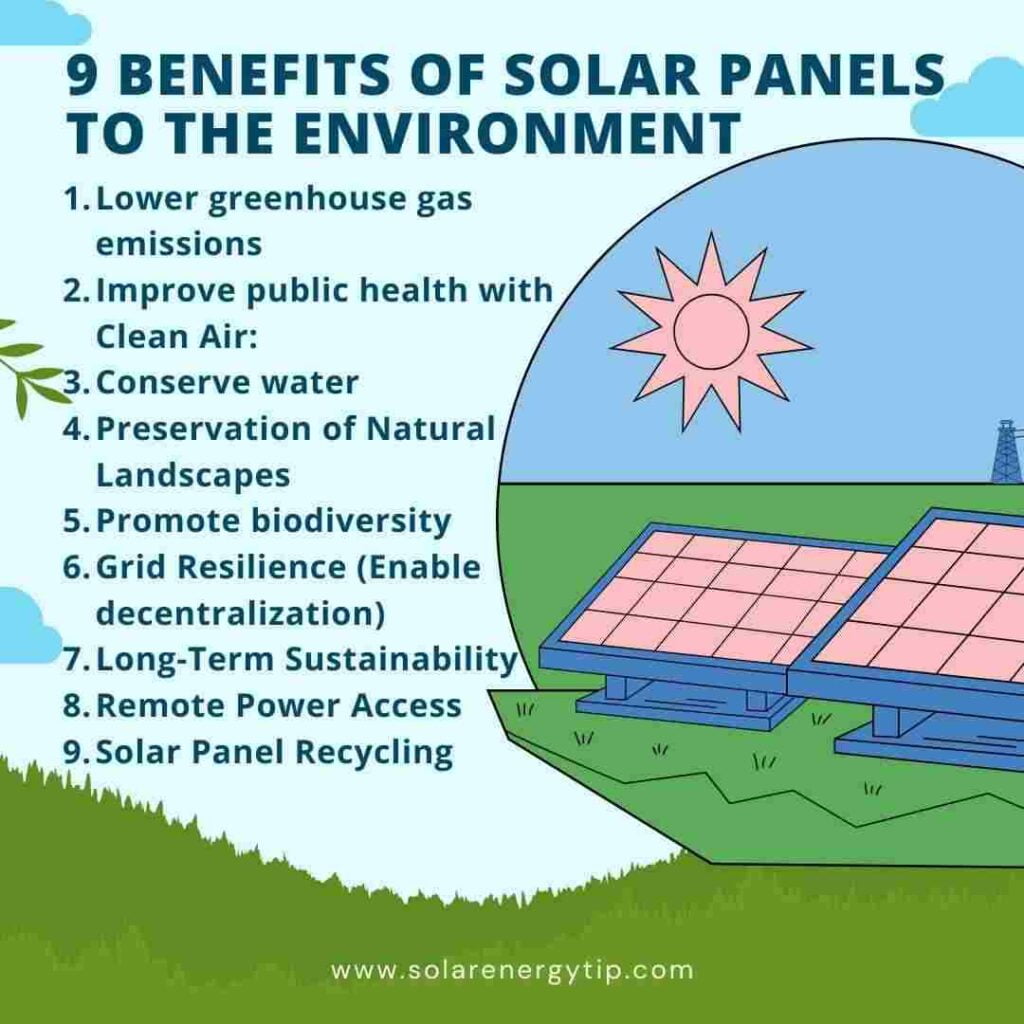
According to the title of my article, I want to show you 9 benefits of Solar energy to the environment which are as follows.
1. Lower Greenhouse Gas Emissions
Solar panels are an environmental superhero, emitting zero carbon dioxide (CO2) during energy production.
In fact, a single residential solar system can save over 200 tons of CO2 over its lifetime, equivalent to planting more than 5,000 trees.
2. Improve Public Health With Clean Air
Solar power keeps our air pristine.
A National Renewable Energy Laboratory study found that solar energy prevents millions of tons of harmful emissions, including sulfur dioxide and nitrogen oxides, which contribute to respiratory problems and acid rain.
3. Conserve Water
Solar PV systems are incredibly efficient water-savers.
Unlike fossil fuel power plants that guzzle water for cooling, solar panels require virtually no water to generate electricity.
This helps conserve water in regions facing scarcity.
4. Preservation of Natural Landscapes
Solar installations can coexist harmoniously with nature.
For instance, solar farms can be designed to use elevated structures, allowing plants and wildlife to thrive underneath, and preserving natural landscapes.
5. Promote Biodiversity
Solar projects can become biodiversity hotspots.
Research from the University of California, Riverside, shows that solar panel arrays can host diverse plant life and shelter various animal species, including bees and butterflies.
6. Grid Resilience (Enable decentralization)
Rooftop solar empowers communities during grid disruptions.
In areas prone to power outages, homes with solar panels can continue to function independently.
This self-reliance enhances grid resilience and reduces the impact of blackouts.
7. Long-Term Sustainability
Solar energy secures our sustainable future.
The sun’s energy is practically infinite, and as solar technology advances, its efficiency keeps improving.
Embracing solar means investing in a future where clean, renewable energy is abundant, reducing our reliance on finite fossil fuels, and benefiting our planet for future generations.
8. Remote Power Access
Solar energy lets people tap into clean power without harming the environment, which is game-changing here in the USA.
Remote cabins and vacation homes can use solar panels instead of expensive, eco-damaging grid connections.
RVs and boats can also go solar, eliminating fossil fuel reliance.
9. Solar Panel Recycling
When panels eventually wear out after about 30 years, solar recycling companies repurpose the materials into new solar cells.
This recycling aligns with America’s green commitment to reducing waste through innovation.
By enabling self-sufficient off-grid living and establishing a solar panel recycling system, the USA shows how harnessing the sun’s rays can provide independent, sustainable energy that protects our planet.
How Do Solar Panels Help the Environment?
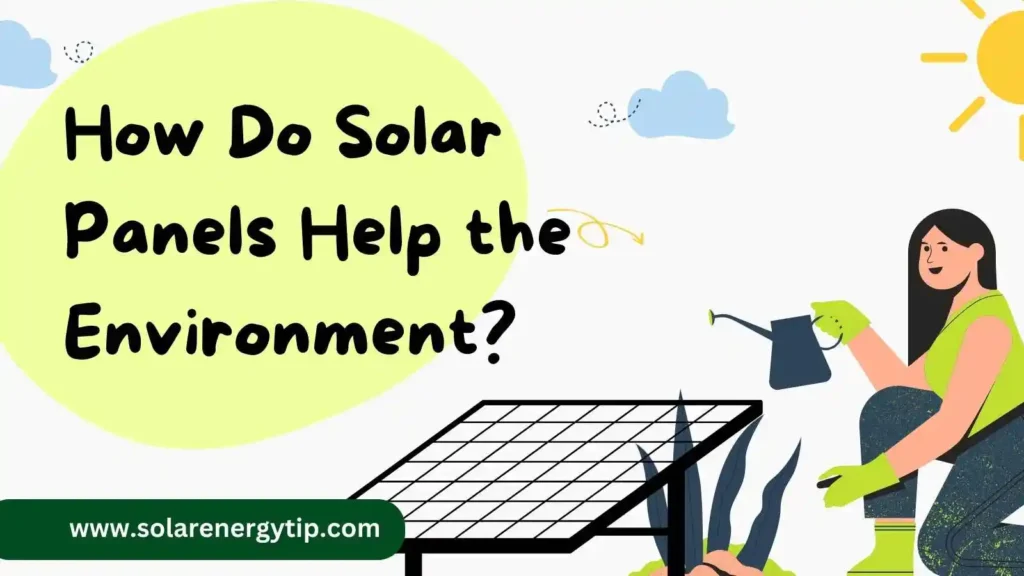
Burning fossil fuels like coal and gas creates nasty air and water pollution that damages human health.
But if we switch to solar power instead, we can reduce emissions that cause early deaths and drive up healthcare costs.
Solar panels provide clean, renewable energy from the sun rather than contaminating our air and water like dirty fossil fuels do.
Another benefit is that solar electricity doesn’t require water to generate, so it relieves stress on limited supplies, especially during droughts and heat waves when other sources struggle.
By harnessing the sun’s rays, solar avoids the environmental harm of traditional electricity.
That’s why when people ask why are solar panels good for the environment, the answer is clear – they give us energy without polluting our atmosphere.
Advantages of Solar Energy to The Environment
A growing number of households worldwide are choosing to install solar panels in their home to reduce their energy costs.
Because the use of solar energy and its advantages is very good for the environment, by using it you can tidy up your home and the environment.
From a very wide point of view, solar energy is sustainable and green energy, and solar energy not only reduces your electricity bill but also has huge benefits for our planet’s atmosphere.
You can use the energy generated by installing solar panels on the roof of your house to save the earth’s environment and become less dependent on the power grid.
The following are some of the advantages of solar energy to the environment we will discuss further.
- Reduce Water Usage
- Renewable resources, solar energy
- Improves Humanity’s Health In The Long-run
Disadvantages of Solar Energy to The Environment
Did you know that,
According to the U.S. Energy Information Administration, some toxins and chemicals make photovoltaic cells that convert sunlight into electrical energy.
- Materials sourcing: Manufacturing solar panels requires intensive mining for materials, raising supply and emissions concerns, but recycling and alternative materials can help mitigate this.
- Water use: Solar thermal plants use large amounts of water for cooling, which strains resources, but PV solar does not require water to generate electricity.
- Toxic materials: Solar panels contain toxic materials like lead and cadmium that must be disposed of properly to avoid soil and water contamination. Proper recycling is important.
- Land use: Solar farms can take up large land areas and disrupt ecosystems if not properly sited, but rooftop and parking lot solar can minimize land use impact.
- Reflectivity: Solar arrays can cause glare and disrupt wildlife, but site selection and screening solutions can help.
- Backup power: Solar intermittency requires backup power sources that have their environmental impacts, but pairing them with other renewables helps.
- Emissions in manufacturing: Manufacturing panels generate some emissions, but solar’s clean energy benefits over its lifespan far outweigh the upfront impacts.
If we ignore the disadvantages of these few types of solar panels and consider why solar panels are good for the environment, we can understand the importance of solar panels.
Are Solar Panels Actually Good for the Environment?
Solar panels are undoubtedly beneficial to the environment. Because solar energy systems do not create any pollutants when producing electricity.
By producing solar energy, they lessen greenhouse gas emissions and fossil fuel consumption.
Despite having negative effects during manufacture and disposal, they are environmentally helpful in the long run since they reduce air pollution and carbon emissions.
What is the Future of Solar Energy?
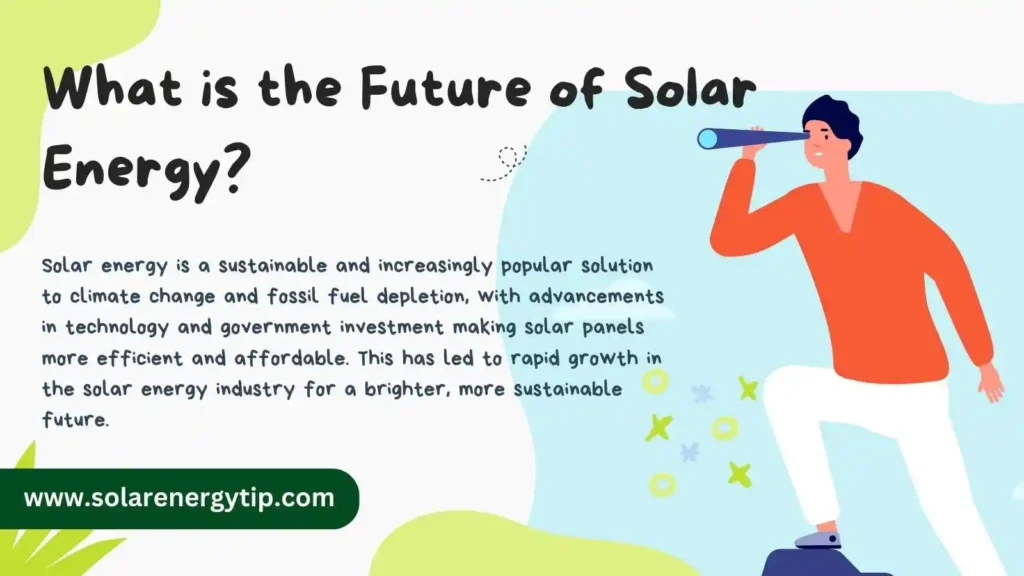
If you have studied why are solar panels good for the environment, you will know that in the future, many people will go ahead to get renewable energy using solar panels.
In this high-tech age, we need power – for our smart gadgets and computers, and with climate change, we have to make that power clean.
Looking ahead, solar energy is hands-down the most sustainable choice to meet our needs without harming the planet.
Why? The sun provides endless renewable energy without pollution.
As solar farms expand and panels go up on more roofs, we’ll tap the sun’s gifts instead of dirty fuels.
Using solar now and into the future helps ensure a livable world. Plus, we’ll have juice for our devices, So I say let’s keep embracing the limitless potential of solar.
Positive Environmental Impact of Solar Energy
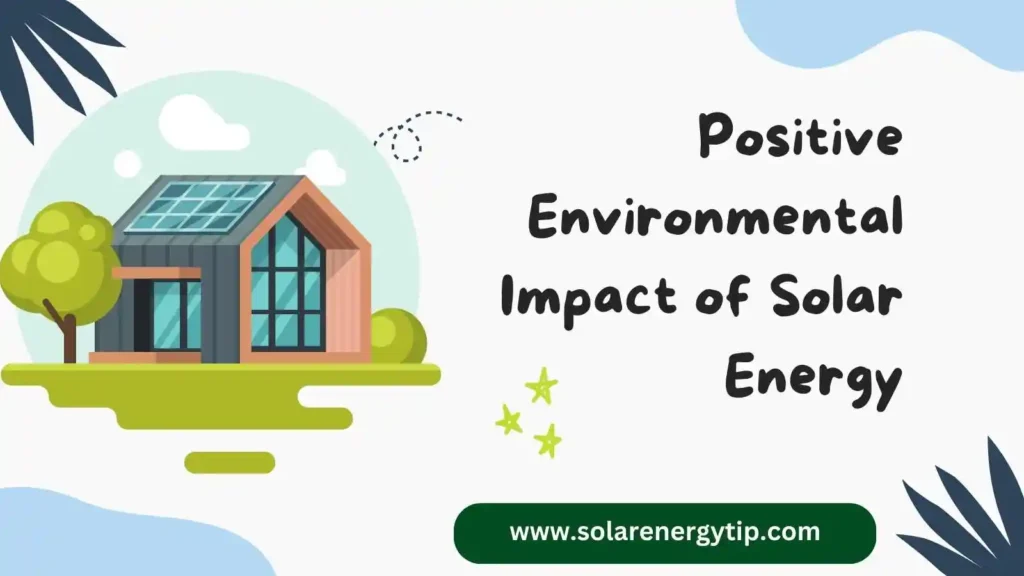
There are so many sources of inspiration you can use solar energy in your home or business.
You can use your solar panel to generate as much electricity as you need at any time, and you cannot rely on your local utility for that.
To get an idea of why solar panels are good for the environment, we are taking a look at the positive impact of solar energy on the environment.
Suppose you plan to use solar panels to generate electricity for your home or business.
In that case, you can not only save your dollars but also do an important job considering the benefits of the following three eco-friendly advantages.
FAQs
Why is solar energy considered environmentally friendly energy?
Because solar energy does not cause any pollution in the production of electrical energy, solar energy is called environment-friendly energy.
Are solar panels bad for the environment?
Solar panels convert sunlight into electricity using photovoltaic cells. Toxic materials are used in constructing these photovoltaic cells, so it can be said that solar panels are a bed for the environment.
However, it is negligible against the massive environmental damage caused by conventional electric power generation.
How does solar energy help the environment?
Solar energy is useful in reducing environmental and air pollution and water use in power generation, so we can say that solar energy helps the environment.
Conclusion
The environment is very important in today’s life, so we get information on why are solar panels good for the environment used to generate electricity.
This article covers the points of solar panels, the benefits of solar panels, the environmental advantages and disadvantages of the Solar energy environment, the future of solar energy, and the positive impact of the Environmental impacts of solar energy.

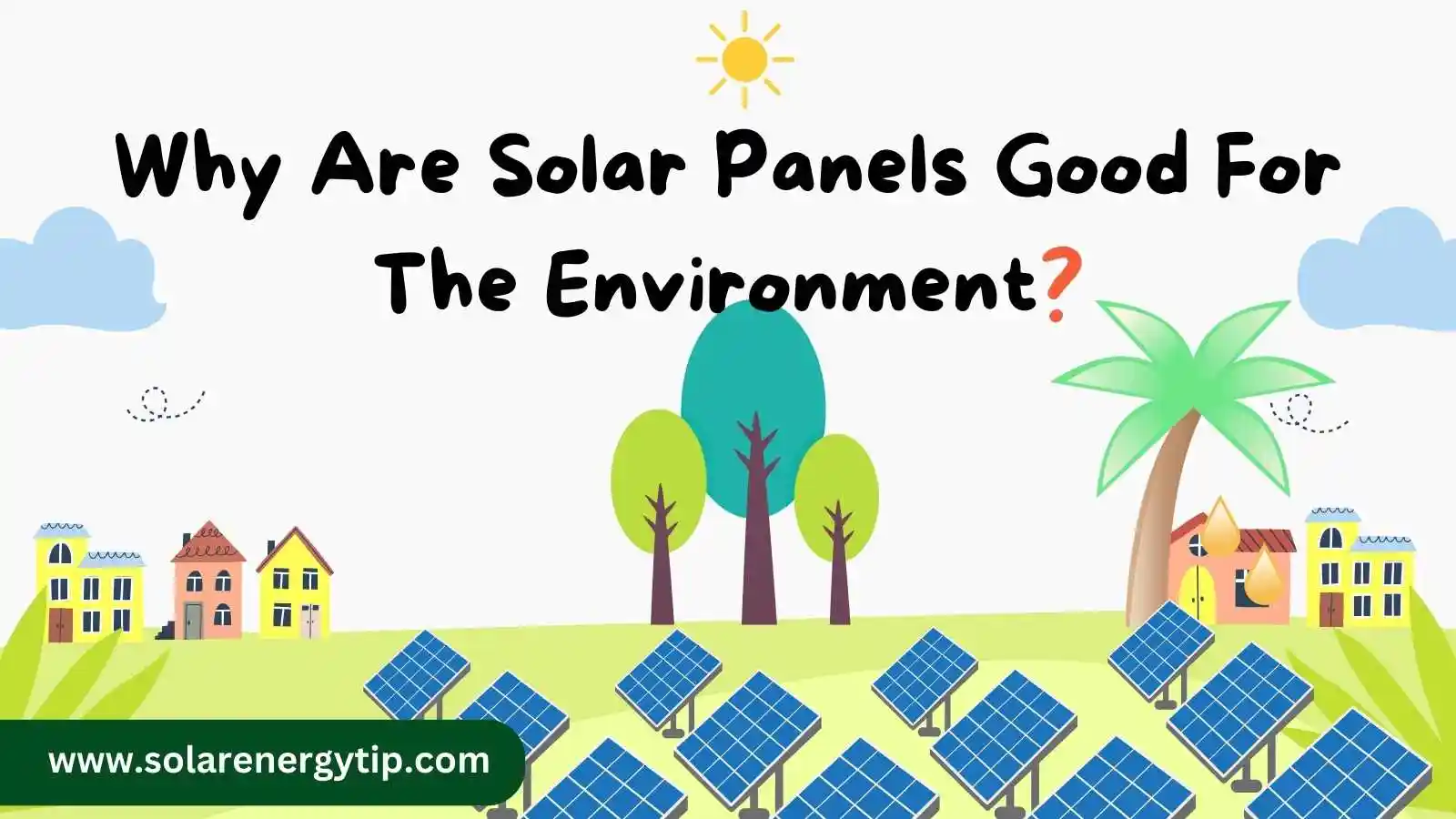
There are usually not many websites with info like this man! Bookmarked!
I like that you pointed out how solar panels could create clean energy that would greatly reduce air pollution. Our energy bills have been quite high lately so we are thinking of ways on how to minimize it. I heard having solar panels is one of the best measures, so we should probably ask for solar panel installation services.
The reduction in pollution you can contribute to when using solar energy really intrigues me. With how large our house is, I can bet that we can install a pretty impressive system if we seek the help of an expert so the panels can be installed well. Once I find a roofer in the area that provides solar panels, I’ll work with them straight away.
Yes and thanks for suggesting me